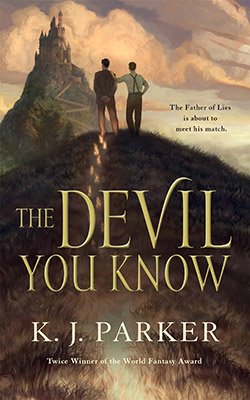If there’s one thing you can say with certainty about the work of K. J. Parker, it’s that there’s always more to it than meets the eye, so the fact that the personage of K. J. Parker hid a similar mystery made more than a modicum of sense. Who was he really? What might his use of a pseudonym mean? Was he even a he?
For a decade these questions played a part in damn near every discussion of the aforementioned author, and factored, furthermore, into the mystique surrounding everything he’d written in addition. Then, late last April, the big secret was revealed: K. J. Parker was indeed a he, and his alter ego was Tom Holt. Of course. In the wake of the stories surrounding the announcement, I found myself wondering whether we might not have lost some of the patented K. J. Parker magic in the course of getting to know the unknown. Well, if The Devil You Know is anything to go on, the answer to that question is a resounding no.
After the small wonder that was The Last Witness, a taut tale about a gambler who bets on memories, an equally brief book about a business transaction sounded, I’ll say, decidedly less exciting. But things get very interesting very quickly, because the deal that sets this subversive story in motion is between a famous philosopher known as Salonius and—well… the devil. Or at least his employee of the year.
The former fellow will be familiar to folks who remember reading Blue and Gold—either in its own right or as part of K. J. Parker’s sought-after Subterranean Press collection, Academic Exercises—as a Jack of all trades who dabbled, in that narrative, in alchemy. His dabbling, alas, led to the death of his folding knife of a wife, but on the bright side, “after writing all those amazing books and inventing all that amazing stuff, he finally became rich as a result of discovering how to make synthetic blue paint.”
But for some, money is not enough—and so to The Devil You Know, which stars a Salonius approaching the end of his life with what he says is his single greatest ambition still unfulfilled. His appeal to the Powers That Be for a mite more time inspires a swathe of suspicions in the demon dispatched to discuss terms with said, but with the immortal soul of such a significant figure on offer, the deal is done with just a little dickering.
Our standard form of contract—
Slightly amended to suit the specific requirements of the customer, but the core phraseology, the magic words that do the business, always stay the say—indefeasibly and absolutely devise and remit, in perpetuity, and so forth. In this case, we’d thrown in a guaranteed twenty years of healthy life, plus rejuvenation to age twenty-five. Apart from that, he was entitled to the usual package of benefits; access to limited specified supernatural powers through the agency of his designated case officer. That would be me.
When his charge begins behaving strangely, Salonius’ so-called case officer’s earlier concerns reemerge. The erstwhile alchemist invades a country—whether for power, prestige or because “years ago a Mysian kicked sand in his face on a beach somewhere […] you just don’t know” (p.48)—then sets about bringing his dead wife back to life. But hang on a cotton-pickin’ minute; he didn’t even like her!
I was deeply troubled. Not in itself unusual; but I had a distinct feeling that I’d missed something. That’s not a normal or comfortable feeling for me. I don’t miss things. Like I said, I live and have my being in the detail. Also, if I had that feeling, it was because I was meant to. It was as thought he’d put up a big painted sign saying UP TO SOMETHING and was sitting directly beneath it.
Our demon just doesn’t understand—which goes some way towards making him the more relatable of The Devil You Know‘s pair of narrators. Repeated reflections on his “God-given” gift for keeping secrets make Salonius himself seem smug and superior; his case officer, on the other hand, is an actual agent of evil, but at least he’s decent. For a demon.
Confusing this issue still further is the fact that both of the aforementioned perspectives are explicated in the first-person, without even a twist in tense to differentiate them. By design, I dare say, this decision is likely to leave some readers feeling frustrated, but as with anything Parker has a hand in, there’s a method behind the apparent madness, and in this instance, the method is seemingly meaningful, and finally fulfilling.
Add to the cleverly-conceived characters The Devil You Know depends upon any number of K. J. Parker’s other trademarks: droll dialogue; engrossing asides; the winningly disinterested way he works in worldbuilding; a smorgasbord of semi-colons; and finally a feeling, from the first, that there’s more to this story than meets the eye. Like Salonius says:
Keeping secrets from the All-Seeing isn’t as hard as it sounds. The key is making sure they don’t correctly interpret what they see. Simple misdirection; the street conjurer’s stock-in-trade.
This is K. J. Parker’s gift: the ability to tell one story while seeming to tell another—and it’s as satisfying here as it’s ever been.
The Devil You Know is available now from Tor.com Publishing.
Read an excerpt from the novella here on Tor.com
Niall Alexander is an extra-curricular English teacher who reads and writes about all things weird and wonderful for The Speculative Scotsman, Strange Horizons, and Tor.com. He lives with about a bazillion books, his better half and a certain sleekit wee beastie in the central belt of bonnie Scotland.










